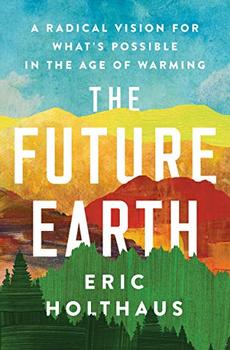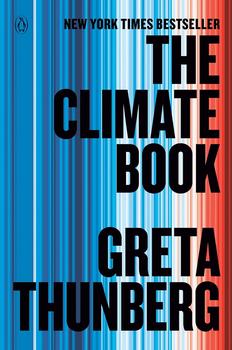Summary | Excerpt | Reviews | Beyond the book | Read-Alikes | Genres & Themes | Author Bio

A Radical Vision for What's Possible in the Age of Warming
by Eric HolthausIt's a tough ask, getting ordinary readers to engage with books about climate change. I read more about the environment than most because of my interest in nature and my husband's background in meteorology and wildlife conservation. However, I can sympathize with people who feel that books about the climate crisis would be a) too technical for them to understand, b) boring, when they turn to books for entertainment or an escape from reality, and c) depressing. "Why dwell on the predicament we've gotten ourselves into if there's nothing we can do to solve it?" some might think. (And that's not to mention those who are ideologically suspicious of climate science in the first place.)
The Future Earth is an attempt by meteorologist and science journalist Eric Holthaus to write a different kind of book about the current and future state of the environment. Holthaus is from Kansas, where irrigation for farming is draining the Ogallala Aquifer at an alarming rate. As a scientist, but also as a parent, he was desperate for some hope. In fact, in January 2017, he had started counseling for what he calls "climate-related depression" (see Beyond the Book). He admits, "To this day, I struggle to come up with what I should do or how to focus my attention and energy to fight climate change. But I can tell you that part of the answer is just talking about climate change and its existential threat, and to know you are not alone."
In the first third of the book, Holthaus sets out the problem. In recent years, natural disasters have been breaking records consistently. The warming climate is a "living emergency," he says, and it is becoming real for people more than ever through events like Hurricane Maria in Puerto Rico in September 2017 — after years of drought, the storm led to flooding that was five times worse than it would have been in the 1950s. Along with 3,000 human lives, the islands lost millions of trees and much valuable habitat for wildlife. This is just one example Holthaus gives of how our collective decision to ignore global warming has led to dramatic alterations in the world's weather. These transformations disproportionately affect low-lying and/or developing countries, such as the Marshall Islands. This "is no longer just about science," he writes. "It is now, at heart, an issue of justice."
Holthaus makes a clear case for the need for creativity and revolution. He imagines this happening via three broad steps: 1) coming up with a vision for the future, 2) tearing down the current system and 3) building a new world. He breaks the middle part of the book into three chronological sections, covering the decades between 2020 and 2050, and in each chapter he blends realistic predictions with best-case scenarios that could be brought about by technological and political shifts.
Some of his proposals would be considered radical by current political norms. Drawing on the notion of the cyclical economy (also known as "doughnut economics," Kate Raworth's term), he imagines a move away from dichotomies like capitalism and socialism and towards schemes of stewardship and cooperation. This is not simply a practical, financial concept but also a social and even spiritual one: Holthaus looks to Indigenous peoples for a model of sharing and respect for the earth instead of individual ownership and the exploitation of resources.
There is much to admire in this vision of the future. However, there are flaws in how it is delivered. The book's content feels repetitive and unstructured in places. The first part, in particular, includes a lot of material that will be familiar to those who have read up on related topics. It is also an overlong introduction to the meat of the book, which is the detailed rundown of the next three decades. Moreover, the chapters on the future involve yet more recent history and science before switching into speculative fiction ("The start of the 2020s wasn't easy. We were awash in thunderstorms...") that includes a freak hurricane hitting D.C. during an emergency session of Congress. The combination of fact and fiction is unusual; while this is a strategy that was likely employed to avoid dull lists of directives, it doesn't quite work.
We don't often recommend books with 3-star ratings on BookBrowse, but have chosen to feature this one because of the gravity of its message. Its ideas are well worth engaging with. Finding reasons to be hopeful about the future of the planet is important, but bringing these optimistic possibilities into reality will require working together and being willing to consider drastic measures. Holthaus ends with journaling prompts and reflection questions to make the topic personal and to challenge readers to think about what they as individuals or small groups can commit to doing. Climate change, like death and other awkward or unpleasant subjects, is something that we must become comfortable talking about if there is to be any progress.
![]() This review
first ran in the July 15, 2020
issue of BookBrowse Recommends.
This review
first ran in the July 15, 2020
issue of BookBrowse Recommends.

If you liked The Future Earth, try these:

The Lost Trees of Willow Avenue
by Mike Tidwell
Published 2025
A riveting and elegant story of climate change on one city street, full of surprises and true stories of human struggle and dying local trees – all against the national backdrop of 2023's record heat domes and raging wildfires and, simultaneously, rising hopes for clean energy.

by Greta Thunberg
Published 2024
We still have time to change the world. From Greta Thunberg, the world's leading climate activist, comes the essential handbook for making it happen.
Your guide toexceptional books
BookBrowse seeks out and recommends the best in contemporary fiction and nonfiction—books that not only engage and entertain but also deepen our understanding of ourselves and the world around us.